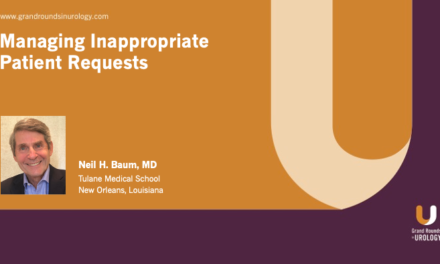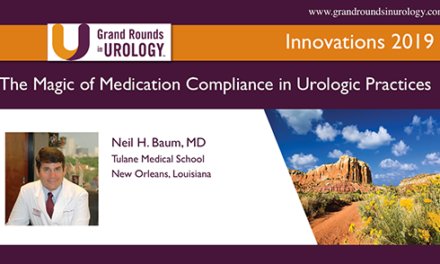Neil H. Baum, MD, presented “The Present and Future of Artificial Intelligence in Medicine” for the Grand Rounds in Urology audience in February 2022.
How to cite: Baum, Neil H. “The Present and Future of Artificial Intelligence in Medicine.” February 2022. Accessed Apr 2024. https://grandroundsinurology.com/the-present-and-future-of-artificial-intelligence-in-medicine/
The Present and Future of Artificial Intelligence in Medicine
Grand Rounds in Urology Contributing Editor Neil H. Baum, MD, Professor of Urology at Tulane Medical School, discusses current and future applications of artificial intelligence (AI) in medical practice. He describes AI as the game changer of the 21st century, and lists its numerous current uses in the clinical setting, such as reading mammograms, examining retinas of diabetic patients, reading pathology slides, screening for skin cancer, uncovering health disparity between whites and non-whites, and collating and summarizing millions of similar cases for doctors. Dr. Baum also highlights several nonclinical uses for AI, observing that AI’s ability to complete clinical data entry allows the doctor to focus on their interaction with patients. He then argues that AI will not replace physicians because clinical judgment will not be replaced by data and algorithms, patients do not want to be treated by a machine or algorithm, and AI cannot provide empathy and understanding. Dr. Baum moves on to consider the future of AI healthcare, suggesting that it will fill in the gap caused by the pending physician shortage and the aging Baby Boomer population. He claims that AI will automate routine processes that consume so much of a physician’s time, such as processing routine requests from the inbox, medication refills, and result notifications. He lists other future medical applications for AI, including improving drug compliance through home AIs like Alexa, identifying patients who are or are not eligible for certain treatments, and monitoring patients between visits. Dr. Baum concludes that AI will serve as an adjunct for physicians and help increase available knowledge while allowing doctors to focus on empathy and understanding.
For more commentary on practice management from Dr. Baum, visit his Improving Your Urology Practice page.




